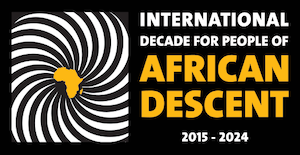Advancing Equity and Social Justice for People of African Descent
Leave no one behind.
This goal is central to the United Nations 2030 Agenda for Sustainable Development – which represents the commitment of Member States to eradicate poverty in all its forms, to end discrimination and exclusion and to reduce inequalities and vulnerabilities. Yet discrimination, racism, sexism and intolerance continue, creating disparities in access to services and human rights.
People of African descent often confront structural racism and discrimination, leading to inequities in health, development and access and rights to housing and property, education, jobs, political participation and reparative justice.
Afrodescendant women and girls across the Americas are more likely to die during childbirth due to racist and sexist neglect and abuse. Abysmal maternal death rates are attributed to genetic predispositions or failures of the mothers, when the true culprit is discrimination – for instance, a lack of post-partum care – which can lead to fatal consequences. A woman’s race should not determine whether she lives to see her newborn child.
Guided by the 2030 Agenda, as well as the Montevideo Consensus on Population and Development, the Durban Declaration and Programme of Action and the International Decade for People of African Descent, UNFPA works to advance the cause of Afrodescendants, particularly women, girls and young people, and to help fulfill their human rights, their dignity and their potential.
Learn more about the lived experiences and efforts to advance rights and development for people of African descent:
Read the UNFPA report Maternal Health of Women and Girls of African Descent in the Americas
Read the UNFPA brochure Ensuring Quality Maternal Health for Women and Girls of African Descent
Read the UNFPA report In our words: Voices of Women of African Descent for Reproductive and Climate Justice
Learn more about the United Nations bodies and mechanisms that are committed to advancing equity and social justice for people of African Descent:
- International Decade for People of African Descent: The United Nations General Assembly proclaimed 2015–2024 as the International Decade for People of African Descent, recognizing the 209 million people in the Americas who identify as being of African descent as a distinct group whose human rights must be safeguarded.
- Ten years of activism have yielded some progress for Afrodescendent people, with the world increasingly recognizing their contributions to global equity, peace and prosperity. Yet people of African descent – and especially women and girls – remain among the world’s most marginalized, as structural racism and sexism continue to bar their access to health, empowerment and autonomy. Learn more about the initiative and how you can participate.

- UNESCO’s Slave Route Project: This project aims to contribute to a better understanding of the causes and consequences of slavery; to highlight the global transformations that have resulted from this history; and to promote a culture of peace by reflecting on inclusion, cultural pluralism, intercultural dialogue and the construction of new identities and citizenships.
- Ark of Return: The Permanent Memorial to Honour the Victims of Slavery and the Transatlantic Slave Trade at the United Nations continues to stand as a reminder that the legacies of slavery, including racism and inequality, still affect us all.
- Durban Declaration and Programme of Action: This initiative serves as the United Nations’ blueprint to combat racism, racial discrimination, xenophobia and related intolerance globally, embodying the firm commitment of the international community.
- Montevideo Consensus on Population and Development: Established at the first session of the Regional Conference on Population and Development in Latin America and the Caribbean, this initiative constitutes the roadmap for the integration of population dynamics and sustainable development with equality and a rights-based approach.
- Permanent Forum on People of African Descent: Formally adopted by the General Assembly in 2021, this initiative is a consultative mechanism for people of African descent and other relevant stakeholders, serving as a platform for improving the safety and quality of life and livelihoods of people of African descent, as well as an advisory body to the Human Rights Council.
- #FightRacism: Join the UN Human Rights Office in fighting racism. Each and every one of us can speak out and stand up against racial prejudice, discrimination, xenophobia and intolerance.
- People of African Descent international days:
- International Day of Women and Girls of African Descent, 25 July: The UN General Assembly has proclaimed 25 July as the International Day of Women and Girls of African Descent. The day provides a global platform to honour the rich history, culture and contributions of Afrodescendant women and girls, while also acknowledging their ongoing fight against discrimination based on gender, race and socio-economic status. Co-sponsored by Brazil and Colombia, the resolution calls for Member States, UN entities and civil society to commemorate this day with events and actions that elevate the voices and stories of Afrodescendant women and girls. This observance is both a celebration of progress and a call to continue the work towards a more just and equitable world.
- International Day for the Elimination of Racial Discrimination, 21 March: Established by the UN in 1966, the International Day for the Elimination of Racial Discrimination is dedicated to raising awareness and combating all forms of racism worldwide.
- International Day of Remembrance of the Victims of Slavery and the Transatlantic Slave Trade, 25 March: The International Day of Remembrance of the Victims of Slavery and the Transatlantic Slave Trade was established by the UN to honour the millions of Africans who suffered and perished during more than 400 years of enslavement and to educate future generations about the history and consequences of the transatlantic slave trade.
- International Day for Countering Hate Speech, 18 June: The UN established the International Day for Countering Hate Speech to raise awareness of the growing threat of hate speech worldwide and to promote the importance of dialogue, tolerance and respect in combating harmful rhetoric and fostering inclusive societies.
- International Day for People of African Descent, 31 August: The International Day for People of African Descent was established by the UN to celebrate the diverse heritage, culture and contributions of people of African descent worldwide, while promoting efforts to combat all forms of racism and discrimination against them.
- International Day for the Abolition of Slavery, 2 December: The International Day for the Abolition of Slavery commemorates the adoption of the UN Convention for the Suppression of the Traffic in Persons and the Exploitation of the Prostitution of Others in 1949, highlighting ongoing efforts to eradicate modern forms of slavery, including human trafficking, forced labour and child exploitation.
Updated 31 October 2024








